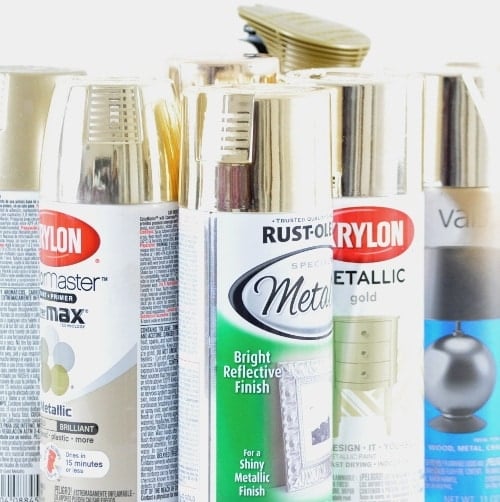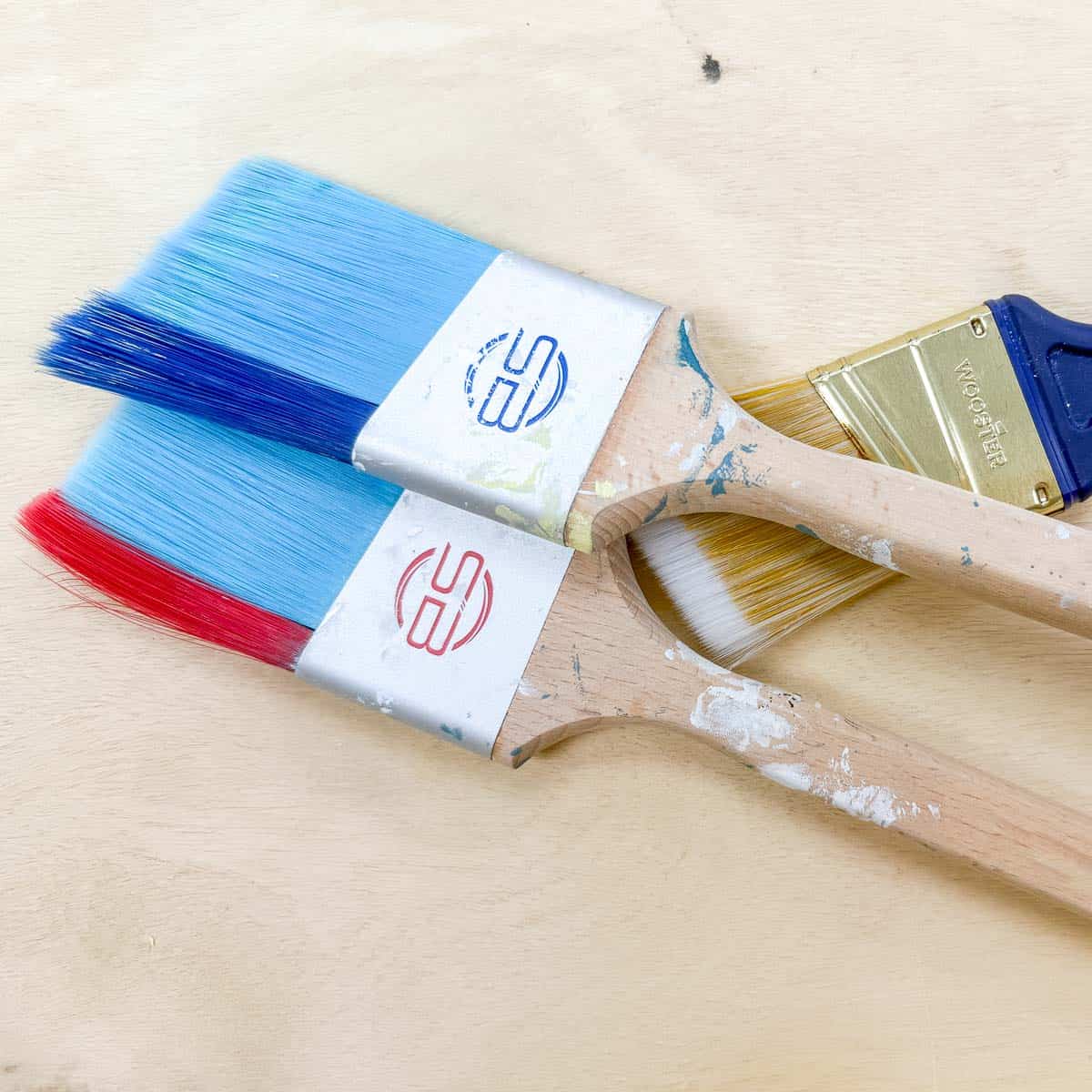How to Clean Dried Paint Brushes: Testing 7 Methods
I tested seven methods and found the easiest and best way to clean dried paint brushes. This technique can clean a completely dried paintbrush in 2-3 hours.

I absolutely love painting projects! There’s just something so fun about adding a pop of color to furniture or decor. But let’s be honest: The cleanup part isn’t so much fun, but it is pretty crucial.
The other day, I painted a project and forgot to wash my paintbrush at the end. A few days later, I realized that my favorite brush was rock solid with bristles stiffened with dried paint. I had just purchased a brand new paint brush before the project because I had forgotten to clean my previous paintbrush in the past… you see how it is a habit 😆
***This post contains referral or affiliate links. It is a way for this site to earn advertising fees by advertising or linking to certain products and/or services. Please read my full disclosure here ***

In case you are wondering, this paintbrush is absolutely the best one ever! I pretty much exclusively use it.
I was pretty heartbroken, so I asked my Instagram audience for ideas. Honestly, I expected everyone to give me one or two techniques to help clean it up. But to my surprise, I got a whole bunch of recommendations—from warm vinegar to Goo Gone to dish soap and even Murphy’s oil soap.
So, I decided to turn this into a fun experiment to find out which method really works best to clean up paintbrushes with dried paint.
What Can You Use to Clean Dried Paintbrushes
I received many different recommendations through my Instagram stories and internet research. It seemed that everyone used a different technique.
After some research, I narrowed down the candidates to seven.
- Warm vinegar
- Goo Gone
- Rubbing Alcohol (with a plastic wrap on top to prevent evaporation)
- Simple Green
- Laundry Detergent and water mix (1:3)
- Dawn Dish Soap and water (1:3)
- Murphy’s Oil Soap

As you can see from the list above, I made sure to only include candidates that were easy to find in the home or in the cleaning aisle. I also made sure not to use anything that could be harmful with fumes, etc.
Let’s Find out How to Clean Dried Paint Brushes
I have a full video so you can see the experiment at work. A detailed written report is below.
Setting up the Experiment
The goal of every experiment is to change only one thing. So, I made sure to use the same type of brushes, approximately the same amount of liquid, and soak everything for the same amount of time.
Step 1: Set up the Brushes
- I dipped cheap paintbrushes in paint and let them dry out over the weekend.

It also happened to be the hottest weekend of the year for us so that helped make sure that the brushes dried up really well quickly.
Step 2: Set up the Liquids
- I used disposable clear plastic cups and labeled them with numbers and the liquid they each had.
- I poured approximately the same amount of liquid into them.
- I also labeled each of the brushes with numbers to know which brush was added to which liquid.
Step 3: Allow Paint Brushes to Soak
- I dipped the paintbrushes in the liquids so that they covered.
- I let the brushes soak for various periods of time and checked them to see if the bristles were softening up and then rinsed them out to see if they could be cleaned.

I checked on how they were doing at 90 minutes of soaking, 3 hours of soaking, and soaking overnight.
After 90-Minutes of Soaking
- Warm Vinegar – The bristles started to bend, and they were a little bit softer than they were
- Goo Gone – The bristles were very hard, and there was no change at all.
- Rubbing Alcohol – The bristles were very soft, and there were paint particles in the alcohol.
- Simple Green – Still pretty hard. Not bending at all.
- Laundry Detergent and water mix (1:3)- Pretty soft and there are a few particles in the liquid.
- Dawn Dish Soap and water (1:3) – Bristles bend a little bit.
- Murphy’s Oil Soap – Not hard. Just a little bit softer but not enough to call it effective.
After 3 Hours of Soaking
- Warm Vinegar – Pretty much like it was at the 90-minute mark.
- Goo Gone – No change at all.
- Rubbing Alcohol – There are a lot of paint particles in the liquid, and the bristles feel really soft.
- Simple Green – Starting to soften up a little bit.
- Laundry Detergent and water mix (1:3)- It seems to be getting slightly softer.
- Dawn Dish Soap and water (1:3) – Not much different from the 90-minute mark.
- Murphy’s Oil Soap – Still the same.
At this point, I decided to try washing the three brushes that looked a little promising: the warm vinegar, rubbing alcohol, and laundry detergent solution.
- Warm vinegar – It didn’t really wash off. The paint was still pretty stuck to the bristles and didn’t come off.
- Rubbing Alcohol – This paint on the brush cleaned off easily! I rubbed the bristles with my fingers and palm, and all the paint came off as little particles. In the end, the brush was clean and good as new!
- Laundry Detergent and water mix—It did clean out a little bit. It’s definitely better than the one with the vinegar solution, but it’s not good enough.

At this point, rubbing alcohol was a total winner! After just three hours of soaking (and I suspect it may have washed off at the 90-minute mark as well), the brush was almost brand new!
I returned the vinegar and laundry detergent brushes to their solutions and left them all overnight.
After 16 Hours of Soaking:
- Warm Vinegar – Pretty soft but doesn’t feel any different than when I washed it at the 3 hour mark.
- Goo Gone – No change at all.
- Simple Green – became pretty soft.
- Laundry Detergent and water mix (1:3)- It was pretty soft.
- Dawn Dish Soap and water (1:3) – Became softer than last night
- Murphy’s Oil Soap – A little bit soft, but not really.
At this point, I decided to end the experiment and wash all of the brushes to see how they turned out.
- Warm Vinegar – No change. No effect of washing.
- Goo Gone – No effect of washing.
- Simple Green – No effect of washing.
- Laundry Detergent and water mix (1:3)—The paint is coming off by pulling at the bristles. This would be pretty time-consuming and also harsh on the bristles.
- Dawn Dish Soap and water (1:3) – No effect of washing
- Murphy’s Oil Soap – No effect of washing at all.

What Is the Best Way to Clean Dried Paintbrushes?
The BEST way to clean a paintbrush is rubbing alcohol. Soaking in rubbing alcohol for about 90-180 minutes softened the bristles, and the paint almost melted off of them. The brush could be cleaned to look almost new.
The runner-up is the laundry detergent mix, which can be cleaned up with a little elbow grease.
To make sure that the result was reproducible, I soaked my favorite paintbrush – the brush that started this whole experiment- in rubbing alcohol for 2 hours.

I am happy to say that the paint came right off the paintbrush, and it now looks as good as new!

Have you had any success with any of the techniques listed above? Let me know in the comments.
You might also like:
Anika's goal is to inspire and empower beginners with woodworking, DIY, home improvement, and home decor ideas.
She wants everyone to unlock their creative potential and experience the feeling that comes with making something. Nothing feels better better than seeing something and saying "I can make that!"














Awesome! Thank you so much; this is so helpful!
Hi Anika, lots of good tips. The alcohol one is one I used to determine acrylic from others. Alcohol takes off acrylic paint, not oil base or vinyl paints so it’s an easy test.